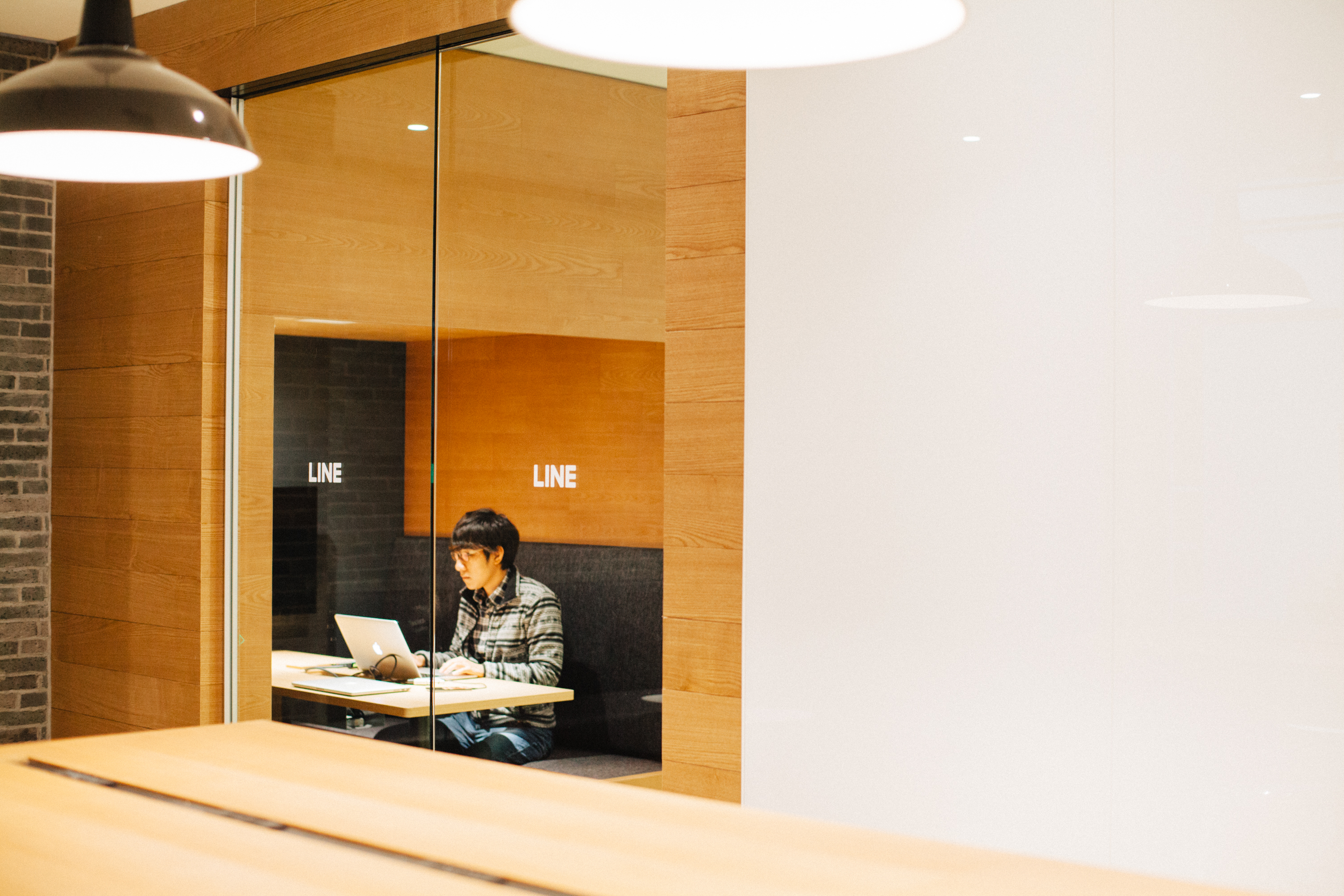
Engineers in Line’s Fukuoka office / Image credit: Line
Two years ago, a headhunter contacted Wang Yung Hsing, a Taiwanese engineer, about a role with a Japanese firm. At that time, he had just left a failing Singapore-based startup.
“[The call] came at a good time. I was interested to know more, so I asked which Japanese company it was,” says Wang, who admitted that back then, everything he knew about Japanese working culture had come from watching TV shows.
“Line,” the headhunter told Wang, who eventually interviewed for and got the job. Since then, he has been working at the Japanese firm’s Fukuoka office as a software engineer.
“Living in Japan is really fun. There are many live concerts here, and I love going to them,” shares Wang. The 38-year-old heavy metal fan saw Guns N’ Roses in Osaka and Iron Maiden in Tokyo over the last two years.
Wang’s story is fairly common, especially at Line, which will set up an office in Kyoto in June this year. Since the company began hiring foreign engineers three years ago, the ratio between local and overseas staff in the engineering team has been tilting towards the latter.
“Right now, 60 percent of our engineers in Line Fukuoka are foreigners. We have more foreign engineers than Japanese [ones],” says Atsushi Wada, Line Kyoto’s chief engineer. Wada, who is now building the team for the Kyoto office, had managed foreign hires in Fukuoka.
The chat service platform is also not the only company hiring foreigners in Japan, which has the third-largest economy in the world. Convenience-store chain Lawson, cosmetics maker Shiseido, and computer manufacturer Fujitsu are among some of the top Japanese firms that hire non-locals.

A peek into Line’s newly completed Fukuoka office / Image credit: Line
Japan opens borders to boost workforce
In 2016, lawmakers said they would amend the country’s labor policy to beef up its diminishing workforce.
Masahiko Shibayama, a policymaker and adviser to Prime Minister Shinzo Abe, had told a group of reporters in Singapore that “doubling the number of foreign workers cannot be avoided in this global market situation,” adding that Japan has to develop “a sustainable system for accepting more and more foreign workers.”
However, under Japan’s foreign policy, only professional workers with specialized skills in certain industries, such as information technology or engineering, would be welcomed. This is evident, given the absence of work visa categories for unskilled labor such as construction or caregiving. Workers in these sectors are only allowed temporary employment in the country under the guise of “training programs.”
This difference in the treatment of foreign hires is an intentional act by policymakers – they want to avoid public debates on immigration, which is a polarizing issue in the country. The current administration goes as far as to calling foreign labor “guest workers” instead, steering clear of the word “immigration.”
“For ordinary people, they see the rapid increase in foreign tourists and they see more foreigners downtown, so it’s not strange that some think, ‘Is it good that it’s increasing this much?’” Shibayama said in an interview with The Japan Times.
Still, Japan faces a graying population. Despite the political climate, the number of foreign workers in the country shot up to a record high of 1.28 million toward the end of 2017, according to data from the country’s labor ministry. The figure marks an 18 percent increase from the previous year. Foreign trainees and students made up most of the number.
Line’s engineering department faced a somewhat similar problem. According to Wada, the chat titan started to see fewer local engineers as early as 2015, so it began to hire from outside the country.
He continues, “In Line Fukuoka, we experienced some difficulties hiring Japanese engineers. We had to expand [our hiring to] overseas.”

An engineer in Line’s Fukuoka office / Image credit: Line
A gaijin’s struggles in a traditional country
Not speaking the language is the most difficult part of living in Japan as gaikokujins (外国人) or non-locals, according to the foreign engineers who spoke to Tech in Asia.
“When the headhunter first told me about the role in Line, I didn’t expect that I could work there,” recalls Wang, who is headed to the soon-to-open Kyoto office. “I (didn’t) speak any Japanese.”
Unbabel, a translation company that handles over 25 different languages, ranks Japanese as the third most difficult language for English speakers to learn, after Arabic and Mandarin.
Adam Millerchip, a 33-year-old British engineer who works in the same team as Wang, has been with the company for over three years. He joined as one of Wada’s first few foreign hires and didn’t speak much Japanese initially.
“If you come to Japan without knowing any Japanese, in the beginning, it’s going to be difficult to live an independent lifestyle,” he points out. “But [Line] supports foreign workers here, so you get a lot of help with that. They’ve got a very good support system.”
To break language barriers in the company, Line provides free weekly language lessons – which include Japanese, Korean, and English – for all its employees. Though the ability to speak Japanese is not a priority when it comes to foreign hires, engineers like Wang and Millerchip benefit from the lessons, which help them in their daily lives in the country.
“A lot of the Japanese [staff] in the company are also learning English now, so they can communicate with non-Japanese [colleagues] better and respect each other more,” shares Wada. He has also noticed that more Japanese staffers are going to English classes now.
“Inside the company, though the common language is Japanese […], English is also quite commonly used when everybody tries to work together,” adds Millerchip.
A radical departure from Japan’s famed work culture
A privilege that Line’s engineering team enjoys is flexible hours – a rarity in a country with an otherwise traditional work culture, where long hours are the norm and employees are known to work themselves to death. Full-time Line engineers can reach and leave work at any time they choose, as long as they finish their work and deliver the results they promised.
Frederik Vogel, a 34-year old German engineer who was hired by Wada about two years ago, spoke at length about his stint at a Japanese gaming company prior to joining Line.
“I had always wanted to make games, so I did. While I was there, I saw the typical office work life in Japan. And after a while, I thought that wasn’t really where I would like to see myself in,” says Vogel, who left that firm after half a year.
“The company only had Japanese workers, and nobody spoke English. The mood and atmosphere in the office were a bit strange – a bit unhealthy even,” he shares, pointing out the similarity of the staff’s condition to disillusioned college kids. “It was like watching them getting their lives sucked out of them day after day.”
In contrast, Line exceeded Vogel’s expectations.
“It’s such a huge difference here at Line. Here, you can feel the freedom and the excitement that you would normally associate with startup companies,” he says.
He continues, “If there’s a problem, you can just say it to anyone, and don’t have to think about the hierarchy or reporting a problem properly. It’s something that I really like. There are no walls here.”

Image credit: Line
Line ramps up foreign hires
When the Fukuoka office decided to look beyond Japan for engineering talents, it had to contend with inertia.
“It was so difficult at first,” explains Wada. “We didn’t know where to start looking, where to advertise, where to begin. But it’s definitely gotten easier over time.”
According to the 41-year-old department head, the culture of the engineering unit in the office has changed since non-local hires came in – it has become more open. Working with foreign talents, Wada observes, has given Japanese workers opportunities to understand various cultures and practices. The reverse is also true, he claims, saying that the foreign engineers enjoy nomikai – the Japanese practice of post-work drinks – more than the locals now.
Though he declined to disclose the total expense of hiring foreign engineers, Wada notes that the overall cost is still cheaper than paying recruiting companies large referral fees to employ new staffers, whether locally or abroad.
As Japan’s reliance on foreign labor continues to grow and policymakers are evaluating labor and immigration policies, corporations like Line are likely to be at the forefront of this development debate.
For more careers in Line Kyoto, check out their page here. These positions are open: Development Engineer, Frontend Engineer, and
Data Engineer. Non-Japanese speakers are welcome.
This post Land of the rising foreign hires: How Japan’s chat titan is recruiting from the outside appeared first on Tech in Asia.
from Tech in Asia https://www.techinasia.com/land-rising-foreign-hires-japans-chat-titan-recruiting
via IFTTT
No comments:
Post a Comment